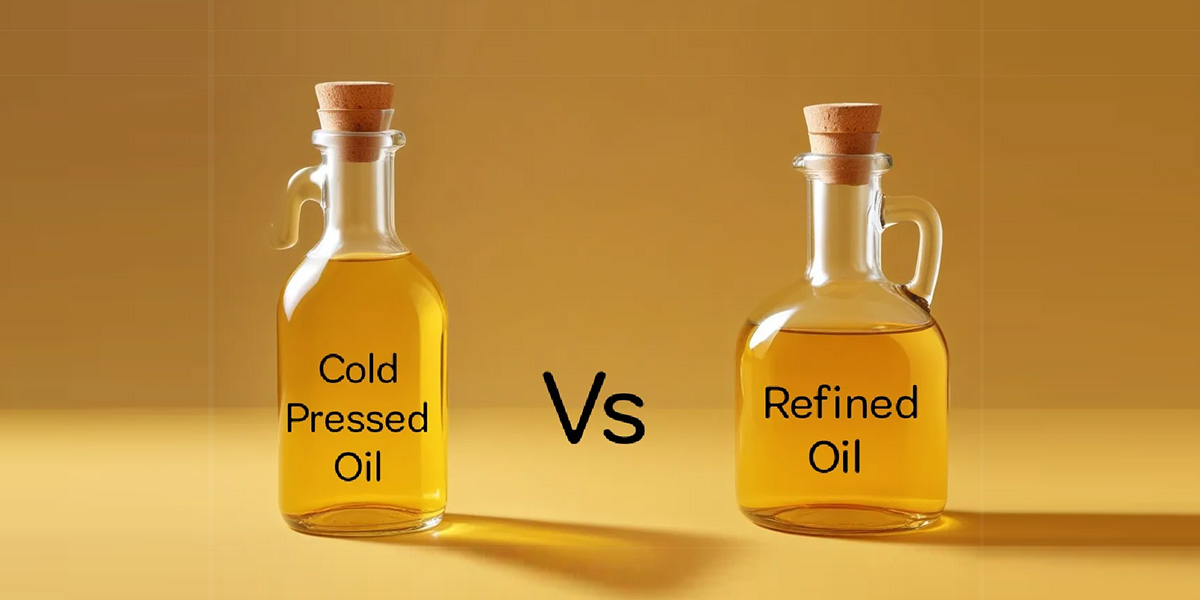When it comes to choosing cooking oils, most of us are familiar with the two major options: wooden cold-pressed oils and refined oils. While both have their place in kitchens, there’s growing awareness about their differences, particularly in terms of their impact on health. So, what’s better for your health cold-pressed oils or refined oils? Let’s break it down and find out.
What Are Wooden Cold-Pressed Oils?
Wooden cold-pressed oils are made using an ancient, traditional method that involves crushing seeds or nuts with a wooden press. This process preserves the oil’s natural nutrients, antioxidants, and flavour. Unlike refined oils, wooden cold-pressed oils are unprocessed, meaning they retain their natural composition and provide numerous health benefits.
How Are They Made?
In the cold-press process, seeds like mustard, groundnut, sesame, and coconut are slowly pressed using a wooden or metal press. The oil is extracted at room temperature, ensuring minimal heat exposure, which preserves its vitamins, minerals, and other beneficial compounds. The result is an oil that’s rich in nutrients, enzymes, and healthy fats.
What Are Refined Oils?
Refined oils, on the other hand, undergo a series of industrial processes including bleaching, deodorising, and high-temperature treatments to improve their shelf life and neutralise their taste and smell. While this makes them more convenient and longer-lasting, it also removes most of their natural nutrients.
How Are They Made?
In the case of refined oils, seeds or nuts are heated at high temperatures to extract the oil, often using chemical solvents. This results in an oil that is lighter in colour and flavour but devoid of the rich nutrients present in cold-pressed varieties. The end product is then refined, which means the oil is stripped of its natural antioxidants and polyphenols.
Health Benefits of Wooden Cold-Pressed Oils
The primary advantage of wooden cold-pressed oils is their unadulterated nature. These oils are high in essential fatty acids, antioxidants, and vitamins, which promote overall health. Here are some key health benefits:
1. High in Healthy Fats
Cold-pressed oils are naturally rich in monounsaturated and polyunsaturated fats, which support heart health by lowering bad cholesterol levels. These healthy fats also improve brain function and hormone regulation.
2. Packed with Antioxidants
Cold-pressed oils retain high levels of antioxidants, which fight free radicals and prevent oxidative damage to cells. This can reduce inflammation, lower the risk of chronic diseases, and promote overall well-being.
3. Vitamin-Rich
Many cold-pressed oils, such as mustard oil and groundnut oil, are rich in vitamins like Vitamin E, which acts as a natural preservative. These vitamins also support skin health, immune function, and tissue repair.
4. Supports Digestion
Cold-pressed oils contain phytochemicals and omega-3 fatty acids that promote a healthy digestive system. They help regulate bowel movements and soothe the digestive tract, providing relief from indigestion and constipation.
5. Better for Cooking at High Heat
Some cold-pressed oils, such as groundnut and sesame oil, have a high smoke point, making them great for frying and stir-frying. Since these oils are not chemically altered, they retain their nutritional value even under heat.
The Drawbacks of Refined Oils
Refined oils, while commonly used for their versatility and long shelf life, have some significant drawbacks:
1. Loss of Nutrients
The high heat and chemical treatment involved in refining oils strip away most of the nutrients, leaving behind an oil that lacks vitamins, antioxidants, and beneficial fatty acids. This means you’re not getting as many health benefits from refined oils.
2. Inflammatory Effects
Many refined oils contain a high level of omega-6 fatty acids, which, when consumed in excess, can promote inflammation in the body. This can lead to conditions like arthritis, heart disease, and metabolic syndrome.
3. Unhealthy Trans Fats
Some refined oils, especially those that are partially hydrogenated, may contain trans fats. These fats are harmful to heart health, as they raise bad cholesterol levels and increase the risk of cardiovascular diseases.
4. Chemical Residues
During the refining process, oils are often exposed to chemicals such as hexane (a solvent), which may leave residues in the final product. While the amount of residue is usually minimal, these chemicals can have long-term health implications.
Which Oil Is Better for Cooking?
When choosing an oil for your cooking, there are several factors to consider. If you’re looking for an oil with more nutrients, better flavour, and healthier fats, wooden cold-pressed oils are the superior choice.
Best for High-Heat Cooking
Certain cold-pressed oils, such as groundnut and sesame oil, have a higher smoke point, which makes them perfect for frying, sautéing, and grilling. These oils can withstand the heat without breaking down into harmful compounds.
For Raw Consumption (Dressings, Drizzles, and Dips)
Cold-pressed oils are also great for raw consumptionlike in salad dressings or drizzled over cooked dishesbecause they provide a rich, natural flavour that refined oils lack.
For Baking and Roasting
Cold-pressed oils work wonderfully in baking and roasting as they retain their nutrients even at moderate temperatures. They help create richer, more flavourful baked goods without compromising on health.
How to Incorporate Cold-Pressed Oils in Your Diet
Now that you understand the differences between wooden cold-pressed oils and refined oils, here are some easy ways to add cold-pressed oils to your diet:
- Use cold-pressed mustard oil for cooking your favourite curries and stir-fries.
- Make a simple salad dressing by combining cold-pressed sesame oil with lemon juice and mustard.
- Drizzle cold-pressed coconut oil over roasted vegetables or add it to your smoothies for a healthy fat boost.
- Use cold-pressed groundnut oil for deep frying snacks like bhujias and pakoras.
Final Thoughts
When choosing between wooden cold-pressed oils vs refined oils, the answer is clear. Wooden cold-pressed oils offer superior health benefits, including more nutrients, antioxidants, and healthy fats. They are naturally free from harmful chemicals and are a much better choice for your heart, skin, and overall health. Refined oils, while convenient, simply cannot match the nutritional value and richness of cold-pressed oils.
Next time you’re at the store, consider swapping out your regular refined oil for a cold-pressed variety. Your health and your taste buds will thank you!




